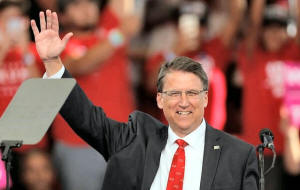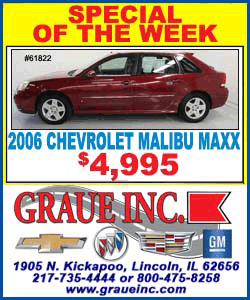|
Half of governor races still too close to
call
 Send a link to a friend
Send a link to a friend
 [November 08, 2016]
By Colleen Jenkins [November 08, 2016]
By Colleen Jenkins
WINSTON-SALEM, N.C. (Reuters) - At least
half of the dozen U.S. governorships being decided on Tuesday remain too
close to call, though political experts agree both Republicans and
Democrats could gain seats in states they would seem unlikely to win.
The razor-thin margins mirror a tightening of opinion polls in the U.S.
presidential race and a number of U.S. Senate contests in the final days
of an unpredictable election year.
Several of the gubernatorial match-ups "can be moved by the slightest
breeze," said Jennifer Duffy, senior editor at The Cook Political
Report, which provides non-partisan election analysis. "Both parties
right now won't even take a guess at what they're going to pick up."
She said the outcome of the vote is not expected to dramatically alter
the 31-18 advantage Republicans have over Democrats in the states'
executive offices. Alaska has an independent governor.
In this year's marquee race, North Carolina Governor Pat McCrory, a
Republican, is fighting for a second four-year term against Democratic
challenger Roy Cooper, the state's attorney general.

McCrory has been dogged by the economic backlash against a law he signed
in March that restricts bathroom rights for transgender people and
limits non-discrimination protections for gays and lesbians.
However, his re-election bid appears to have benefited from his
administration's response to record flooding in North Carolina after
Hurricane Matthew last month.
"Iím not writing McCrory off," Duffy said in a phone interview.
Most of the other toss-up races are Democratic-held open seats, and they
could lead to some surprises.
Republicans may have their best chance at picking up a seat in Vermont,
which is expected to vote overwhelmingly for Democrat Hillary Clinton in
the presidential race. Republican Lieutenant Governor Phil Scott appears
to have the edge over Democrat Sue Minter, a former state transportation
secretary.
[to top of second column] |

North Carolina Governor Pat McCrory waves before speaking ahead of
Republican presidential nominee Donald Trump at a campaign rally in
Raleigh, North Carolina November 7, 2016. REUTERS/Chris Keane

And in West Virginia, where Republican presidential candidate Donald
Trump could get his biggest win, billionaire Democratic businessman
Jim Justice has lead in polls over Republican state Senate President
Bill Cole.
"Thereís going to be a lot of ticket-splitting in those races," said
Kyle Kondik, managing editor of Sabatoís Crystal Ball at the
University of Virginia Center for Politics. "Itís just a question of
how much ticket-splitting there is."
Republicans are battling to defend the governorship in Indiana,
which became an open race after Trump tapped Governor Mike Pence as
his running mate.
That contest and the open seat in Missouri also remain tight, and
Kondik said the Republican gubernatorial candidates could be helped
if Trump gained a late boost in support.
"Just like 2014, there really are hard calls that could go one way
or another," Kondik said.
(Editing by Frank McGurty; and Alistair Bell)
[© 2016 Thomson Reuters. All rights
reserved.]
Copyright 2016 Reuters. All rights reserved. This material may not be published,
broadcast, rewritten or redistributed.
 |